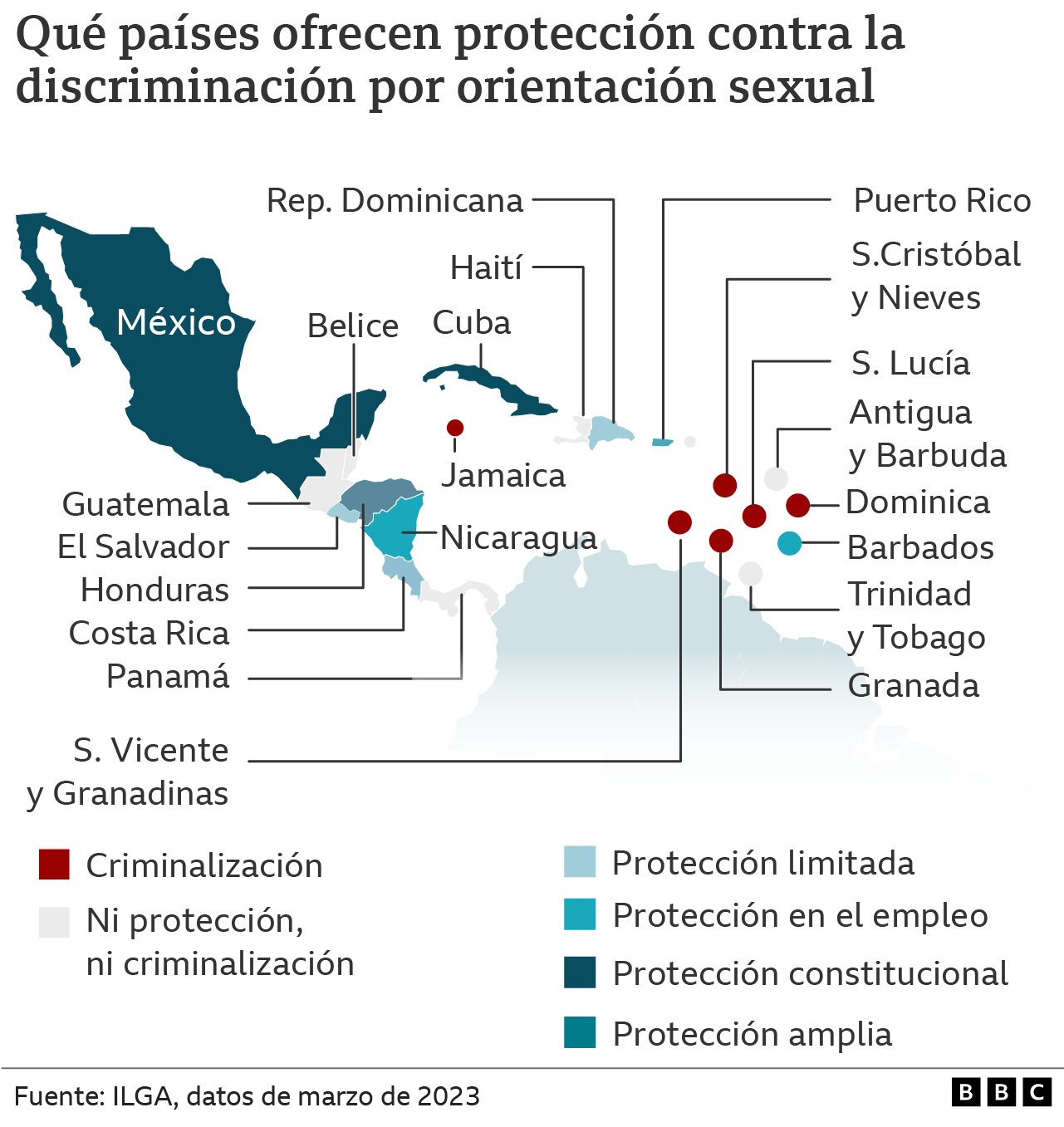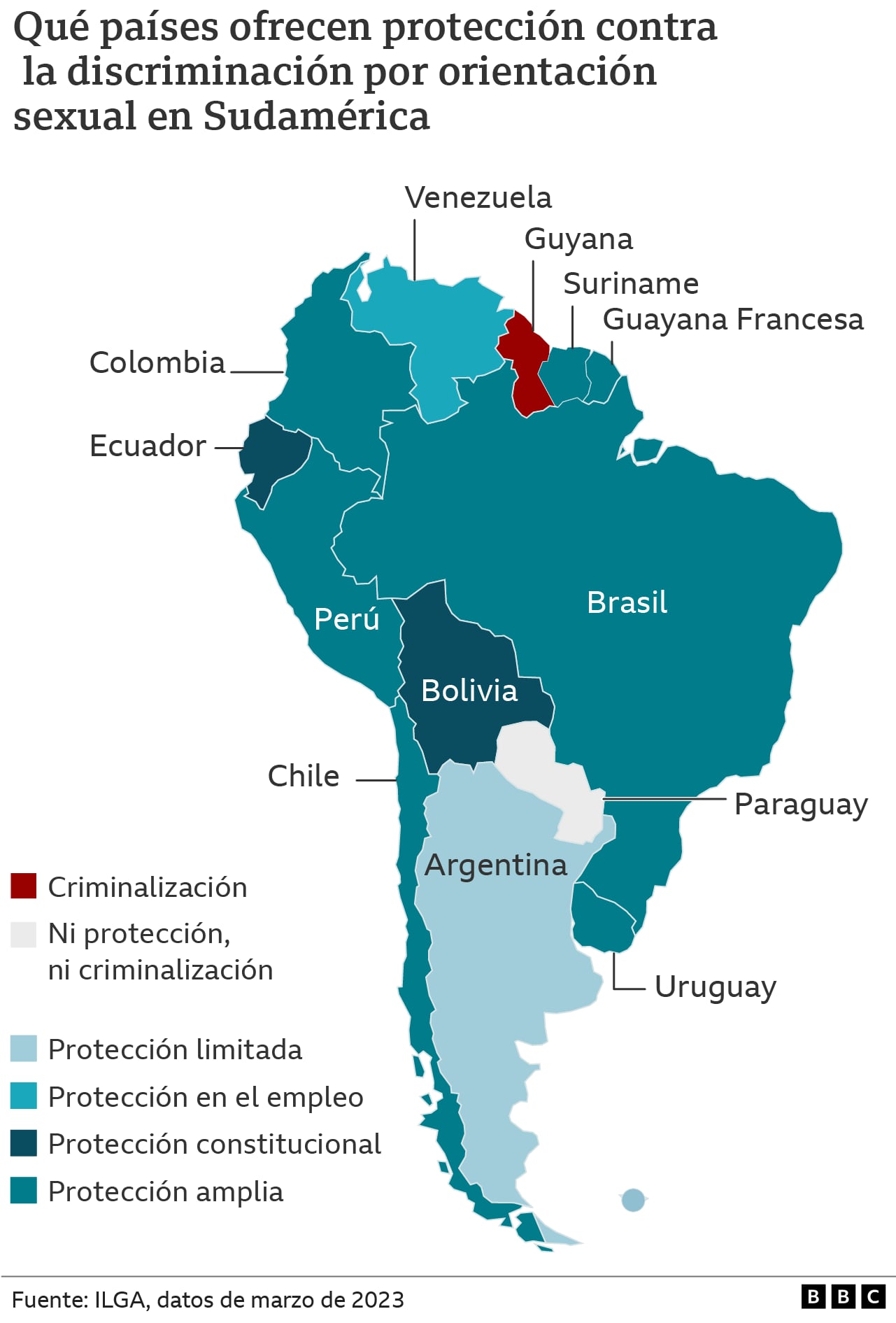The homosexuality it continues to be persecuted in 67 countries around the world, with sentences ranging from a few months in prison to the death penalty.
This is a figure that, luckily, is reduced every year, they say from the LGTBI organizations.
Despite the progress, there are still countries that continue to toughen their policies against this group. the last one has been Uganda, which already punished same-sex sexual relations with jail terms, but whose parliament has just passed a bill to jail anyone who identifies as gay. If the law is ratified, it will be the first in the world to criminalize homosexual identity.
LOOK: Uganda approves one of the toughest laws in the world against the LGBT community: “Homosexuals have no place here”
In the global calculation, however, “there is a progression in terms of penalties, the situation is improving, and this is a trend that we have seen in recent years and even decades,” explains Julia Ehrt, executive director of BBC Mundo. ILGA World, the International Gay, Lesbian, Bisexual, Trans and Intersex Association, based in Switzerland but with members all over the world.
In the last decade, 17 countries have stopped persecuting homosexualityamong them Antigua and Barbuda, Saint Kitts and Nevis, Angola, Mozambique, Singapore and the most recent, barbados.
Last December, the Supreme Court of this Caribbean country struck down sections 9 and 12 of the Sexual Offenses Act, also known as the “sodomy” and “indecency” laws, which dated from British colonial times and could sentencing those who violated them to life imprisonment.
According to the count made by the organizations that defend the rights of this group, 62 UN member states they currently have laws that condemn homosexuality, to which must be added two territories that are not independent: Gaza and the Cook Islands. In addition, two other countries, Egypt and Iraq, punish it “de facto”.
Indonesia is number 67, a country in which, with the exception of territories where Sharia law is applied, such as Sumatra and Banda Aceh, it did not punish LGTBI relations.
However, the reform of the penal code approved at the end of 2022, which prohibits sex outside of marriage, fully affects homosexual relationships since there is no gay marriage in that country. Although the Indonesian parliament has already passed this legislation, it will not come into force until 2025.
“Looking at the global situation, in recent years it seems that we have made progress giving two steps forward and one back“, explains to BBC Mundo Victoria Vasey, head of the legal department of the Human Dignity Trust (HDT), an organization based in London that provides legal support to activists and local associations.
How is the situation in Latin America?
The Caribbean is the only region in the entire American continent where there are still countries that punish homosexual relationships, although, as Alistair Stewart, HDT’s head of Advocacy and Research, states, “in each of them there are active legal cases challenging those laws, so in about five years there might not be any country left that criminalizes LGTBI people in all of America.”
Latin America, in fact, “is at the forefront of LGTBI rightsJulia Ehrt admits.

Four Latin American countries, Bolivia, Ecuador, Mexico and Cuba, as well as some jurisdictions in Argentina and Brazil, offer a constitutional protection against discrimination based on sexual orientation.
This implies, in theory, that all lower laws must incorporate this principle and are considered the most protective countries at the legal level.
In addition, five other countries, Chile, Colombia, Honduras, Peru and Uruguay -in addition to Suriname and French Guiana- offer a “comprehensive protection” against discrimination based on sexual orientation. This also includes protection of access to goods and services, health, education and employment.
Nicaragua and Venezuela offer protection against employment discriminationbut not in the rest of the categories, the same as Puerto Rico.
Among the countries with “limited or uneven” protection includes those where there are no federal anti-discrimination laws, although there are state or local ones.
In this category are Argentina -where there are protective laws in the Autonomous City of Buenos Aires, the province of Río Negro and the city of Rosario-, El Salvador, the Dominican Republic, Belize and Costa Rica.
He gay marriage It is one of the achievements that a large number of Latin American countries have managed to achieve in recent years.
People of the same sex can get married in Argentina, Brazil, Chile, Colombia, Costa Rica, Cuba, Uruguay, Ecuador and Mexico. Except in these last two countries, in all of them, homosexual couples also have the right to adopt children.

In some cases, protective laws have accompanied a social change that was already evident. But in others, it has been the rules themselves that have acted as promoters of change, as is the case in Mexico and Argentina, Lucas Ramón Mendos, lead author of the report, explained to BBC Mundo. “State Homophobia”published in 2020 by ILGA World.
Mendos clarifies that “in countries where there is more legal protection, this does not mean that the situation on the ground is safe or that there is no hostility.” However, there are possibilities to seek State protection in case of violence and discrimination.
advances and setbacks
The hopeful panorama in Latin America contrasts with the situation in other regions of the world, such as the case of Africa, where 32 countries still criminalize homosexual relationships and is perceived as one of the most difficult regions for LGTBI people.
“The growing discrimination against LGBT people in Africa is worrying,” denounces ILGA World, “particularly when countries in all regions of the world, from the Caribbean to Asia, have gone in the opposite direction in recent years and have repealed this type of of oppressive laws of the colonial era”.
In the case of Uganda, the parliament has passed with a very large majority a bill that could sentence people who identify as homosexual to life imprisonment.
to become law has yet to be ratified by the Ugandan presidentYoweri Museveni, to whom organizations such as ILGA, HDT, Amnesty International or the UN itself are now appealing.

As approved by parliament, not only does mere identification as gay become illegal for the first time, but friends, family and members of the community will have a duty to go to the authorities to report people who are in relationships with others of the same sex.
“This bill not only criminalizes LGBT people, but also and very directly their allies, their families… It goes far beyond LGBT people, it reaches all of society“, denounces Victoria Vasey.
The consequences of this bill eventually becoming law would be very dire, not just for Ugandans, but for the entire region, Vasey says. The activist herself remembers that in GhanaFor example, a similar new law is being considered and has been debated in parliament for months, and “they may now be encouraged to follow the same path as Uganda.”
Despite everything, “even in Africa there has been a real improvement,” says Alistair Stewart. As an example, he mentions the cases of Angola, Leshoto, Botswana, Mozambique and Seychelles, countries that have stopped punishing homosexuality.
But one thing is the legislation and another the social climate.
As Julia Ehrt points out, there is “greater scrutiny of trans communities in the United States and the United Kingdom, or of LGTBI people in countries such as Poland and Hungary.”
To this is added Russia, where a new law expands the already existing restrictions on activities that are perceived as “LGBTI propaganda”.
Source: Elcomercio
I am Jack Morton and I work in 24 News Recorder. I mostly cover world news and I have also authored 24 news recorder. I find this work highly interesting and it allows me to keep up with current events happening around the world.

:quality(75)/cloudfront-us-east-1.images.arcpublishing.com/elcomercio/GI4DCMJNGAZS2MZQKQYDAORSHA.jpg)

:quality(75)/cloudfront-us-east-1.images.arcpublishing.com/elcomercio/7IIID5OB7ZATDH7TT7SASVIDCU.jpg)
:quality(75)/cloudfront-us-east-1.images.arcpublishing.com/elcomercio/P323BFQEDJDSLOMMROS5BFNDFQ.jpg)
:quality(75)/cloudfront-us-east-1.images.arcpublishing.com/elcomercio/WQ5CBAGFTZHK5BTVUMDRHX7ETM.jpg)
:quality(75)/cloudfront-us-east-1.images.arcpublishing.com/elcomercio/VG4NWTQT7RH7VIINDA5ETKQ4IQ.jpg)
